Friday essay: ‘rape is civil war’ – the unfinished business of #MeToo opens radical conversations about consent
2024-11-08T10:00:00+11:00

Photo: Adobe stock

With the re-election of Donald Trump, the sex-trafficking allegations against Sean ‘Diddy’ Combs and the Gisele Pelicot case, #MeToo is in the news. Three new books reflect its key themes.
Almost from the moment #MeToo burst into public consciousness back in 2017, commentators have looked for signs that it’s over. But in 2024, it’s big news yet again. A man who has bragged about sexual assault, and has been found liable for sexual abuse by a jury, has just been re-elected president of the United States.
In September, music mogul Sean “Diddy” Combs was arrested and indicted for leading a racketeering conspiracy that engaged in sex trafficking, among other crimes, to which he has pleaded not guilty. Combs has been refused bail – and while he’s been in jail, multiple new lawsuits have been filed against him. #MeToo founder Tarana Burke credits the cultural shift initiated by the movement with bringing the Combs case to public attention and under legal jurisdiction.
Closer to home, in April, Bruce Lehrmann, accused of raping former Liberal Party staffer Brittany Higgins, failed to win the defamation trial he brought against journalist Lisa Wilkinson and Channel Ten, which first aired Higgins’ claims, without naming him. (He is appealing the decision.)
Justice Michael Lee’s judgement that on “the balance of probabilities”, “Mr Lehrmann raped Ms Higgins”, in which he acknowledged that “rape myths” still exist, was welcomed by survivors. Lee’s “trauma-informed” judgement understood that the recollections of an assault victim can be inconsistent, affected by the attempted memory corrections of a traumatised person. The judgement has since been published as a book (without authorisation from Lee or Higgins), with a foreword by sexual consent activist Chanel Contos.)
Surpassing even the Combs case in terms of global attention, however, is the mass rape trial currently unfolding in a courtroom in Avignon, France. Dominique Pelicot, aged 71, is accused of drugging and raping his wife of some 50 years, Gisèle, also 71, many times over a decade – and soliciting dozens of men to do the same, via an online forum titled “à son insu”, meaning “without her knowledge”.
Fifty men, aged 26 to 74 – most of them neighbours and “ordinary” men with jobs, partners and families – are also on trial, charged with sexual assault or attempted sexual assault. Dominique Pelicot has admitted guilt, as have some of the defendants. Others have denied the charges. This week, for instance, one man accused of raping Pelicot six times over six months said “her husband invited me in” and that a husband’s consent was enough.
Gisèle Pelicot’s decision to waive her right to anonymity in favour of a public trial – where she has been sitting through video evidence, with her husband and other accused men present – has seen her become a feminist icon around the world, including here in Australia. She now proudly wears to court each day a scarf made by First Nations women, sent to her as a gesture of solidarity by the Australian Older Women’s Network, who work to raise awareness of sexual assaults on older women. “I’m very honoured to wear it”, Pelicot said this week.
Gisèle Pelicot’s call that “shame must change sides”, words expressed by her attorney as the trial began, has become a rallying cry and feminist slogan, emblazoned on graffiti tributes which have been widely shared on social media.
“The trial has opened a debate on whether to more explicitly spell out the active need for consent within the law on rape in France,” said the Guardian’s French correspondent last month. Whether or not the Pelicot case leads to rape law reform in France remains to be seen. But there is no question that its seismic impact and its many confronting features will be analysed for years to come – including in relation to #MeToo.
Sex, consent, gender and power
After #MeToo went viral in 2017, it reverberated across the globe. One society after another embarked on a “reckoning” about sex, consent, gender and power. Many opinion pieces, articles and books followed.
Such writing, from bestselling Harvey Weinstein exposé She Said (2019) by Pulitzer Prize winning journalists Jodi Kantor and Megan Twohey to feminist philosopher Manon Garcia’s The Joy of Consent: A Philosophy of Good Sex (2023), forms part of a discernible, if capacious genre of #MeToo writing. It collectively charts the movement’s many forms and global spread, while pondering its effects and impact.
Three new additions to the genre – a memoir, a manifesto, and a novel – stand alone on their own terms.
US writer Jill Ciment met her late husband, the artist Arnold Mesches, in 1970. She was a 17-year-old aspiring artist and virgin “whose scant sexual knowledge came from Valley of the Dolls”. Arnold, her art teacher, was 47, “married for twenty-five unfaithful years”. He had two children: a daughter who was Ciment’s age, and a son two years older than her.
In her new memoir, Consent, Ciment reflects on their long and happy marriage, in the light of #MeToo. “It’s a very complex thing,” she told NPR earlier this year. “Do I think he did something wrong? Yeah.” But: “Would I do it differently today? Not for a second.”
Consent both follows on from and critiques Ciment’s first memoir, Half a Life, published in 1996, when she was in her mid-40s – around the same age as Arnold when they first kissed, back in 1970.
In her 1996 account of that kiss, it is Ciment who seduces him. On the last night of art class, she writes in Half a Life, “I unbuttoned the top three buttons of my peasant blouse, crossed the ink-splattered floor, and kissed him”. In Consent, Ciment doesn’t so much query these details – a gifted memoirist, she’s well aware that any account is a crafted “scene”, not a reliable “memory” – as subject them to fresh 21st-century analysis.
Like Ciment’s memoir, the introduction to Hilary Caldwell’s Slutdom: Reclaiming Shame-Free Sexuality has an arresting hook. Caldwell was a 36-year-old single mum and part-time nurse when she started working in the sex industry. Weighed down by “decades of whorephobic stereotypes”, she was “initially reluctant” to see herself as a sex worker. Caldwell kept her job secret from family and friends.
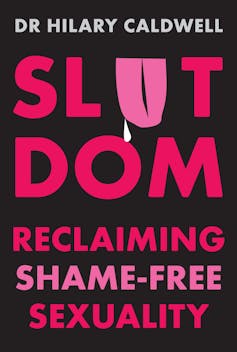
Now an out and proud member of the sex work community, Caldwell has written a book that incorporates that perspective. But Slutdom is not a memoir: it’s a manifesto. Caldwell merges her expertise as a sex worker, sexologist and an academic whose PhD “was the first study in the world to explore women buying sexual services” to passionately advocate for sexual pleasure for women, unburdened by historic and enduring slut-shaming. “Despite the growing momentum created by social movements such as #MeToo and #LetHerSpeak,” argues Caldwell, “women are still held back sexually”.
Slutdom is an attention-grabbing title, but French writer Virginie Despentes matches it with her latest novel, titled Dear Dickhead in English translation. (It’s translated from the French by Frank Wynne, an exemplary pairing of author and translator, as Jennifer Croft celebrated regarding the first volume of Despentes’s Vernon Subutex trilogy, published in English from 2017 through to 2021.) In France, it was published as Cher Connard (roughly translated as “Dear Asshole”).
The title refers to Oscar Jayack, a 40-something, mildly successful novelist who opens the book languishing in the self-pitying turmoil of having been recently “#MeToo’d” by his former publicist, Zoé Katana.
Zoé is now a feminist blogger with many followers, among them trolls from “the manosphere”, but it is not she who issues the “dickhead” expletive. It’s glamorous film star Rebecca Latté, described by herself and others as an icon, now reckoning with the industry’s straitjacket beauty standards as she enters her 50s.
The two are vague acquaintances from childhood, via Oscar’s sister and Rebecca’s one-time best friend Corinne. They strike up an unlikely but propulsive correspondence, starting just before the COVID pandemic begins and continuing right through it. With characteristic audacity, in Dear Dickhead, Despentes brings contemporary verve to what is essentially (apart from occasional interruptions from Zoé’s social media posts) an epistolary novel.
In key respects (genre, location, tone), these three books could not be more different.
Now in her 70s, Ciment imbues an intimate and clear-eyed portrait of a marriage with a keen sense of history. She challenges herself as much as the reader with questions of how we narrate and understand our own experiences of sex, gender and power in relation to the times we live in – or have lived through. Caldwell surveys the sexual landscape with bold authority and a fervent commitment to sex positivity, which sometimes tips over into proselytising. Despentes is, as ever, provocative in the best sense: she somehow manages to both poke fun at #MeToo and to take it seriously.
Yet, read together – and both despite and because of their radical differences – Consent, Slutdom and Dear Dickhead can all be approached as #MeToo books. Each author approaches the various themes that fall under the banner of #MeToo: among them sex, gender, power, pleasure, violence, social media, feminism. This means they also invite analysis as post-#MeToo books.
After all, we are no longer in 2017, when actor Alyssa Milano first invited people to tweet “me too” if they’d been sexually harassed or assaulted, which quickly became the hashtag #MeToo. Nor, indeed, are we in 2006, when Tarana Burke first proclaimed “me too” as an extension of her anti-sexual violence activism, grounded in her community work organising with black women and girls.
As a social movement, #MeToo endures, but as a historical moment or era, these books – among other developments – invite us to think about its effects, what happened next, and what remains to be done.
Consent memoirs and teenage experiences
Jill Ciment’s memoir shares a title with the 2021 English translation of French writer and editor Vanessa Springora’s, Consent (Le Consentement), a memoir published in France in 2020, and in English in 2021. On publication in their home countries, each book was widely reviewed and discussed in the context of #MeToo.

In the 1980s, Springora was 14-years-old when celebrated writer Gabriel Matzneff, aged almost 50, groomed her into a four-year sexual relationship. While Springora was officially a minor and the age of consent was 15, to obtain a rape conviction, it was required to prove sex was non-consensual. Matzneff’s attraction to adolescent girls and boys – and his sex tourism – were not only accepted in the literary circles he moved in, but also defended.
In her memoir, Springora refuses to let Matzneff or his defenders off the hook. She converts her dreams “filled with murder and revenge” into literature, writing in the opening pages: “Why not ensnare the hunter in his own trap, ambush him within the pages of a book?”
Like Springora, Ciment questions the parameters of consent by revisiting her teenage years and the cultural and social mores of the time. Both memoirs are on the short side, but powerful for the concise precision of their prose style. There are other similarities too, including that both women had mostly absent fathers and complicated relationships with their mothers.
In their respective ways, those mothers were complicit in what we now view as the sexual exploitation and/or abuse of their daughters by much older men. (Though to be fair to Ciment’s mother, she did try to stop it as soon as she heard her daughter had kissed a married man.) As for how the law saw it, Ciment was, at age 17, under the age of consent (18) in California, where she lived when she first had sex with Arnold in 1970.

In France, Springora’s memoir made an immediate cultural and political impact. It initiated an investigation into Matzneff’s abuses against minors in France and abroad (since abandoned due to the statute of limitations) and a change in the law. In 2021, the French government passed a bill defining as rape any act of sexual penetration between an adult and a minor under 15. Before that, sex between adults and minors was illegal, but “ambiguous”. It also accelerated the French version of #MeToo: #BalanceTonPorc (“Denounce Your Pig”).
British writer and academic Lily Dunn was one of many to praise Springora’s literary achievement as an act of reclamation: “In finding her voice, Springora was able to forgive herself for her complicity in this drama, and place the blame where it belonged, on the shiny bald head of her elderly predator.”
Lolita and Humbert live happily ever after?
Here we come to the sharp differences between Springora’s and Ciment’s projects. Springora started writing her memoir before #MeToo, and its publication not only dovetailed with the movement in France, but redirected it. Le Consentement was her first book, and established Springora as a writer. She came to understand and narrate Matzneff as an “ogre”, and herself as his victim.
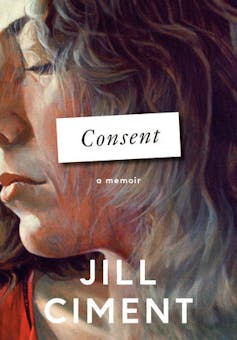
Ciment, however, is already an established novelist and memoirist. Arnold became her husband, though apart from being married with children, he also had a long-time (also married) lover when he and Ciment first met. (“I accepted his Gordian sex life as the birthright of the male artist,” she writes.) The figure of Nabokov’s Lolita hovers over both memoirs, but only Ciment can write: “Lolita and Humbert Humbert marry and live happily ever after? Who would believe such a story?”
In Half a Life, Ciment allocated Arnold a few major scenes, among them the aforementioned kiss and their reunion after she returned from four months in New York City, where she’d tried and failed to embark on her career as an artist. In the revisiting, Ciment is confronted with her earlier depictions and omissions.
She left out that Arnold had written her a letter, asking her when she was coming back to class and to please call. “He not only wrote a solicitation to an underage girl; when he didn’t hear back from the girl, he called her.” In the first memoir, she sped to his studio, and in their passionate reunion, started to cry and asked him why he hadn’t called her.
Ciment dressed him in an “eye-frying white” T-shirt he never would have worn in real life. She updates the scene: “I remember noticing how his newly exposed middle-aged neck sagged. I found it repulsive, yet I chose to overlook it.” Soon after, Arnold taught her about fellatio, exerting a new kind of power as a teacher: “carnal knowledge”. Ciment writes: “He had the knowledge and I wanted it.”
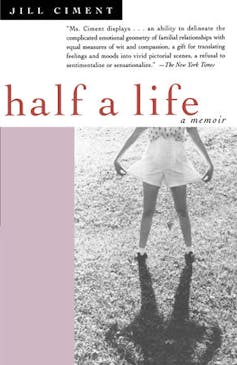
Ciment describes her first memoir as “a bildungsroman, a story of education”. For male narrators, this literary form traditionally ends when he embarks on his vocation. For female protagonists, it “classically ends in marriage”. But in Half a Life, 40-something Ciment, staking her claim as a writer and artist, cut off the Arnold story at the point where she goes to art school: a “story stops when the writer doesn’t know what to say next; it ends when there is nothing more to be said”.
In Consent, Ciment revisits their origin story, testing it against cultural changes. Early on, she asks “should I refer to him in the language of today – sexual offender, transgressor, abuser of power?” Then later: “Had Arnold experienced the sea change of the #MeToo era would he have come to believe that he crossed the line when he first kissed me?”
Throughout Consent, Ciment resists easy or conclusive revisionism. Instead, she traces a lengthy and satisfying marriage, shaped by a 30-year age difference. Even as a much older woman than Arnold was when they first met, Ciment remained the young one: a bittersweet fate.
Theirs is not a #MeToo story, or only a #MeToo story – as if any story, however narrated, ever actually is.
Victim blaming and slut shaming
Hilary Caldwell’s PhD research on women who buy sex in Australia first sparked public attention in 2019 with a flurry of stories in the mainstream press spotlighting a growing number of women seeking out the services of both male and female sex workers.
Asked to comment, Caldwell attributed the trend of women using sex workers to “Me Too and a greater conversation around consent”. For the women Caldwell interviewed, paying for sexual services offered physical and emotional safety and an alternative to the dating scene and bad relationships.
Since then, women clients and male sex workers have increasingly featured in the news, with coverage skewed to male escorts earning big money and servicing heterosexual women of all ages. These stories are welcome in their attention to the sexual desires of women and in reducing stigma around sex work.
But in Slutdom, Caldwell offers a more complex, avowedly feminist, and less heteronormative discussion of sex work. And she does so from the basis that while #MeToo has had a positive effect on sexual culture, with the “balance of rape culture” starting to shift and more mainstream coverage of women’s pleasure in sex, it also remains unfinished business.
The bigger picture, according to Caldwell, is a lack of sexual equality for women and gender-diverse people, clearly expressed in victim-blaming and slut-shaming. She argues: “Women will continue to be victims of violence from men and will not experience sexual freedom until slut-shaming has no power”.

Caldwell is as sex positive as they come. She’s proudly kinky and queer, enjoys sex, and has worked for two decades as a sex worker. Like other experienced sex workers, she also has (vividly described) sexual skills she wishes were more widely and positively appreciated as such. Her book is loaded with evidence about the life-enhancing benefits of good sex. But Caldwell had to fight her own internalised “slutphobia” to get to where she is.
Her book is an invitation for readers (especially those most likely to be “slut-shamed”) to join her in living in “slutdom” by rejecting sexual shame in favour of sexual empowerment. (This, she qualifies, is not the same as having lots of sex.) Taking her cues from Laurie Penny’s claim that #MeToo ignited a sexual revolution, Caldwell sees it as “the perfect time to rise up and demand sexual pleasure for ourselves, when, how and with whom we choose”. Post-#MeToo, Caldwell proposes “#SlutToo” as the next step towards “Slutopia” and sexual equality for all.
Caldwell’s enthusiasm for her mission can tip over into cliché and hyperbole (“Sex Work is Humanitarian Work”). But Slutdom is a compelling and valuable book. Caldwell showcases how sex workers and their clients are uniquely placed to illuminate the pleasures and dangers of sex, as well as the importance and practice of consent. With consent education and legislation increasingly promoted and rolled out in Australia and around the world, the well-informed discussion on consent in Slutdom is a welcome contribution.
“Experienced sex workers are boundary-setting and consent experts”, writes Caldwell, while “women who buy sexual services are leading the way in learning to initiate and negotiate consent”. Sex workers who she interviewed shared that women clients are “more aware than men and will ‘check in’ regularly”.
The women Caldwell spoke to about buying sex reported that it gave them more confidence to negotiate consent and to express their desires with new sexual partners. One woman, Cal shares: “Men on hook-ups can be so pushy, so being confident in saying no is really important. Buying sexual services reaffirmed what I really want.”
The ongoing effects of #MeToo flow through the conversations, in observations about what has and hasn’t changed in the dating world. Cassie finds men on hook-up sites “think being on the app is consent” and speculates that “gendered narratives don’t apply as much in same-sex couples”. Charlotte has noticed that #MeToo “has had a big impact on how people initiate sex. Men have become hesitant to initiate anything”. But there is no consensus: the impact of #MeToo is still playing out.
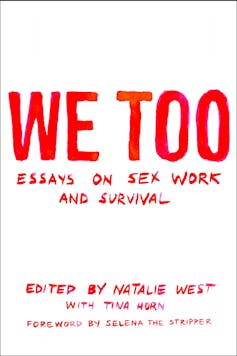
Caldwell convinces readers that sex workers and their women clients have vital insights to offer post-#MeToo. But she also reminds us that sex workers, like other sexual minorities, felt largely excluded from the #MeToo movement. With the resurgence of #MeToo in 2017, some sex workers came forward to share their experiences of sexual assault (as captured in the 2021 anthology #WeToo: Essays on Sex Work and Survival) – but many didn’t.
Coming forward is not easy for any sexual abuse survivors, but for sex workers it is compounded by fear of persecution, concern that anti-sex work campaigners will propagandise their trauma, the difficulty of prosecuting sexual assault in the context of commercial sex, and historic and enduring stigma about sex work.
Caldwell points out the damaging consequences of claims by sex work exclusionary radical feminists (SWERFS) that “being paid for sex is a shameful activity that ‘no’ woman would choose” (the “no-choice narrative”). Such views, she writes, increase sex worker vulnerability to rape, and more broadly exacerbate “slut-shaming, patriarchy’s most effective weapon”. With all this in mind, Caldwell lobbies for #SlutToo.
As should be evident by now, the word “slut” does a lot of heavy lifting in Caldwell’s book – which is a pity. The title may put off readers who would otherwise be drawn to its sex-positive feminist politics and range of perspectives on sex work.
Caldwell signals early that “slut” remains a charged and contested word, especially (but not only) for black women, Indigenous women and women of colour. She denounces sexual racism, which pervades the sex industry as much as it does the wider world. Caldwell is aware, too, of the chequered history of feminist reclamations of “slut”, including the SlutWalk movement.
SlutWalk sprung up in Toronto in 2011, when a local police officer suggested women should “avoid dressing like sluts” as a precaution against sexual assault. Caldwell – like millions of women, as the movement spread around the world – found the SlutWalks “intoxicating” to attend. And while not all women – particularly black women and women of colour – felt the same way, many saw a feminist movement reclaiming “slut” as exclusionary and blind to their experiences and history.
Caldwell marshals rousing arguments, but post #MeToo and with the rise of intersectional feminism, “slut” remains a tricky word to mobilise around – and to stick on the cover of a book.
A French punk #MeToo novel
A #MeToo novel from self-described “punk” writer Virginie Despentes seems preordained. In late 2017, after the hashtag #MeToo was swiftly followed in France by #BalancTonPorc, Le Monde named Despentes one of the most influential people of the year.
Her blazing manifesto, King Kong Theory, first published in French in 2006, was praised as an inspiration for contemporary French feminism, which paved the way for younger feminists to embrace #MeToo.
As #MeToo rolled on in a stop-start fashion in France (with Vanessa Springora’s book as part of it), Despentes articulated the rage of feminists who protested against accused rapist Roman Polański’s award for best director at the 2020 Césars, in a blistering article for Liberation (translated here by Lauren Elkin).
From the very beginning of her career, Despentes has shocked the French literary and film establishments, while attracting an ever-growing fan base drawn to her no-holds-barred, bottom-up take on contemporary France.
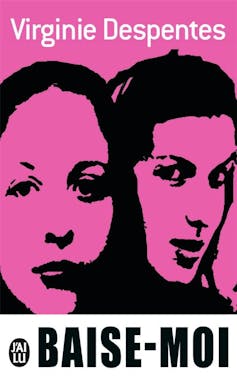
Sexual violence is a pervasive theme. Her first novel, Baise-Moi (1992), translates as “Rape Me”. It’s a rape revenge fantasy of sorts where two young women go on a sex, drugs and punk-rock fuelled killing spree. When Despentes co-directed the film version, released in 2000, with Coralie Trinh Tri, a former porn actor, she cast another two former porn stars in the lead roles. Featuring graphic unsimulated sex scenes and depicting ultra-violence, the film was banned in Australia after a brief initial release, further cementing Desepentes’s cult status.
In King Kong Theory, Despentes revealed she had been raped as a teenager while hitchhiking. After the publication of Baise-Moi, so many women approached her sharing their own stories, she came to the view
it happens all the time. Rape is a unifying act, one that connects every social class and age group, every type of beauty and even personality.
For Despentes, rape is so pervasive and so ordinary that the best response is to defiantly refuse to be shamed into perpetual victimhood. Nor should women allow its ever-present threat to restrict their freedom and autonomy.
Her prose is scorching, as she defines rape, “not war, hunting, naked desire of barbarity”, as the defining feature of masculinity under patriarchal capitalism. “Rape is civil war, the political position by which one sex says to the other: I can take away all of your rights, I can force you to feel inferior, guilty and humiliated.”
Under these terms, we’re all trapped, women and men, but we can resist. For Despentes, casual sex work in her 20s, where she learned “femininity is a game” and saw men as vulnerable and childlike, was a “crucial step in my reconstruction” after she was raped. It was a “compensation settlement” that “calmed my aggressiveness towards men”. Genuinely radical, with an eclectic range of French and American feminist influences, Despentes’ feminism defies easy categorisation.

King Kong Theory has since become a cult classic outside France, prompting its republication in English in 2023, by Fitzcarraldo Editions (in another spirited Frank Wynne translation). It has been lauded by the likes of fellow “autotheory” and “autofiction” writers Maggie Nelson and Chris Kraus. #MeToo has obviously contributed to renewed interest in King Kong Theory, but so has Despentes’s soaring literary fame since she wrote it.
Her novels are typically populated with outcasts and anti-heroes, like the down-on-his-luck ex-record store proprietor Vernon, from the Vernon Subutex trilogy. Yet Despentes herself is no longer a literary outsider. She’s won most major French literary prizes, and even been predicted as a possible Nobel prize winner.
A ‘proper predator’?
When it was published in 2022, Dear Dickhead became an instant bestseller in France – and prompted yet another #MeToo debate, in a country that has had plenty of #MeToo moments, only to have them evaporate.
Now, its English translation has been published as the international spotlight is on France, as one of the most highly publicised rape trials of the century so far unfolds. Madame Pelicot, as many now respectfully address her, has been especially embraced in France, a society which has been notoriously divided over #MeToo.
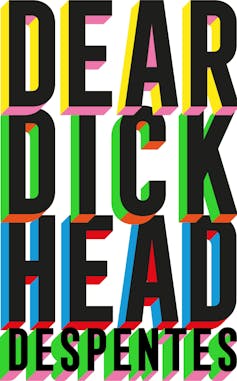
In Dear Dickhead, the #MeToo case is on a much smaller scale, though it’s relevant that the Pelicot mass rape trial only came about because Dominic Pelicot was caught and arrested for filming up women’s skirts in the local supermarket. Like Gisèle Pelicot, Zoé Katana declares “it’s time the shame was on the other side”. By outing her former boss, novelist Oscar Jayack, for sexually harassing her while she was his publicist, Zoé’s profile as an online feminist increases (100,000 followers on Instagram!), but so does the backlash against her.
She has denounced her “pig” – but at what cost and what next? At first, she lets it rip in her public posts, which could have been lifted straight from King Kong Theory:
What is being celebrated when a man rapes a woman – rapes her good and proper – is the very essence of patriarchy.
But Dear Dickhead is no polemic, though Despentes clearly sees a role for it. And she’s not using Zoé as a ventriloquist’s dummy. Nor is Dear Dickhead a “he said/she said” saga. There’s no real question that what Zoé experienced was sexual harassment – even if Oscar’s delusion is that he had a genuine crush and attachment; that he’s too much of a loser with women to be a proper predator.
As he and Rebecca Latté start writing emails back and forth, he mines his lacklustre history with women as if marshalling proof, oblivious to his male entitlement, but Rebecca suffers no fools: “Quit bitching, it’s not like she went to the cops”.
The three main players in Dear Dickhead are various shades of famous, allowing Despentes to satirise their respective industries and worldviews – but not at the expense of some genuine compassion for her characters. Each of them could easily be reduced to a caricature of a type. Oscar, the self-obsessed male novelist; Rebecca, the difficult diva; and Zoe, the extremely online young feminist. Yet Despentes adroitly avoids this by switching first-person perspectives between them, allowing a kaleidoscopic view of #MeToo (and much else) and letting her characters show the best, worst and most vulnerable and deluded parts of themselves.
Optimism can be found in how generational and gender divides – so pronounced in #MeToo discourse – are broken down. Rebecca and Zoe are women from different generations and versions of feminism, but Despentes refuses to make them enemies or avatars.
Rebecca and Oscar are quintessential Gen-Xers. She romanticises life before social media when we “weren’t fishing for likes”, he has an enduring white suburban boy penchant for gangsta rap. They grew up in the same working-class town, and as adults they find common ground in their respective addictions – his to alcohol, hers to drugs – and in sharing observations from the meetings they individually attend to deal with them.
They each notice these meetings are full of men who were sexually abused as boys or teenagers. Oscar writes to Rebecca: “Everyone knows it happens to girls. But unless you’re in NA [narcotics anonymous], you never hear guys talking about it.” In trying to make sense of “why they didn’t make their voices heard during the whole #MeToo thing”, Rebecca surmises: “I think they realised it would cost them too much to speak out. I don’t understand the victim’s shame. I believe it exists – but I don’t understand it.” Rage makes more sense to her.
Gisèle Pelicot understands shame, and clearly so does Despentes. It is a theme she has returned to time and again since her first novel. In Dear Dickhead, Despentes adds new layers and depths to a theme she has been contemplating in writing for over 30 years now.
The #MeToo movement started as a way of expelling the shame by sharing experiences of sexual harassment, abuse and violence. These books invite readers to reflect on what #MeToo has made possible and allowed us to see. It is also clear that #MeToo remains unfinished business, as the Pelicot case so starkly illustrates.![]()
Zora Simic, Associate Professor, School of Humanities and Languages, UNSW Sydney
This article is republished from The Conversation under a Creative Commons license. Read the original article.

Related stories
-

‘Groundhog Day’: 40 years of Australian government responses to domestic violence reveal a bumpy road to change
-

Friday essay: can marriage be feminist? – a ‘hopeless romantic’ says no, but a same-sex newlywed says yes
-

Micro-aggressions are repeated acts that send women backwards. Here’s how micro-accommodations can fight back

